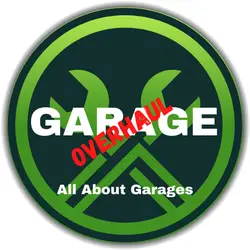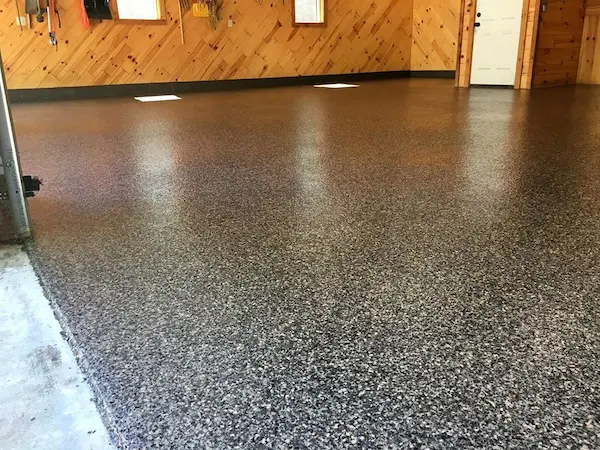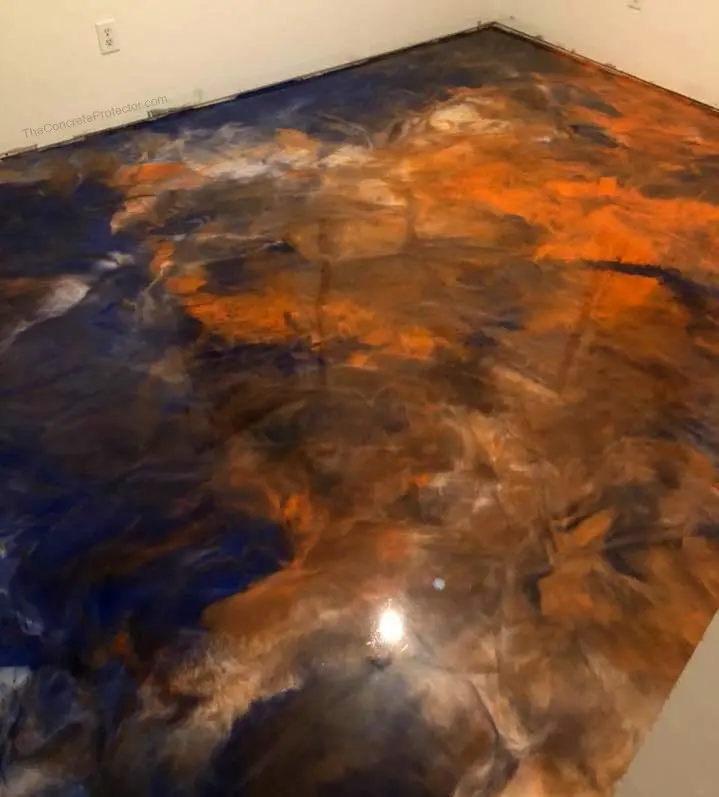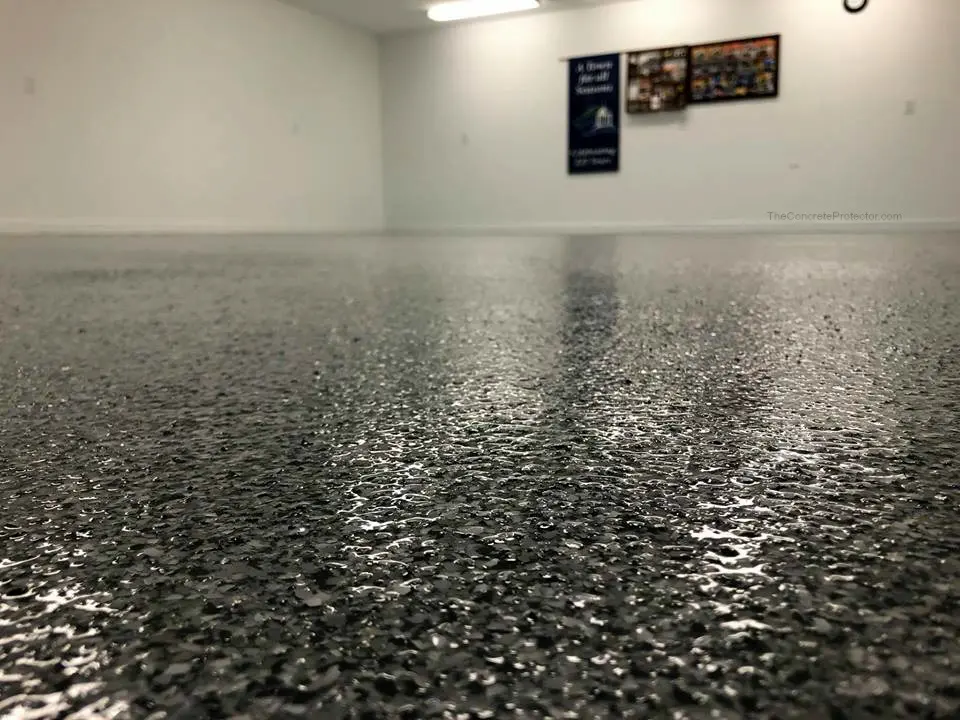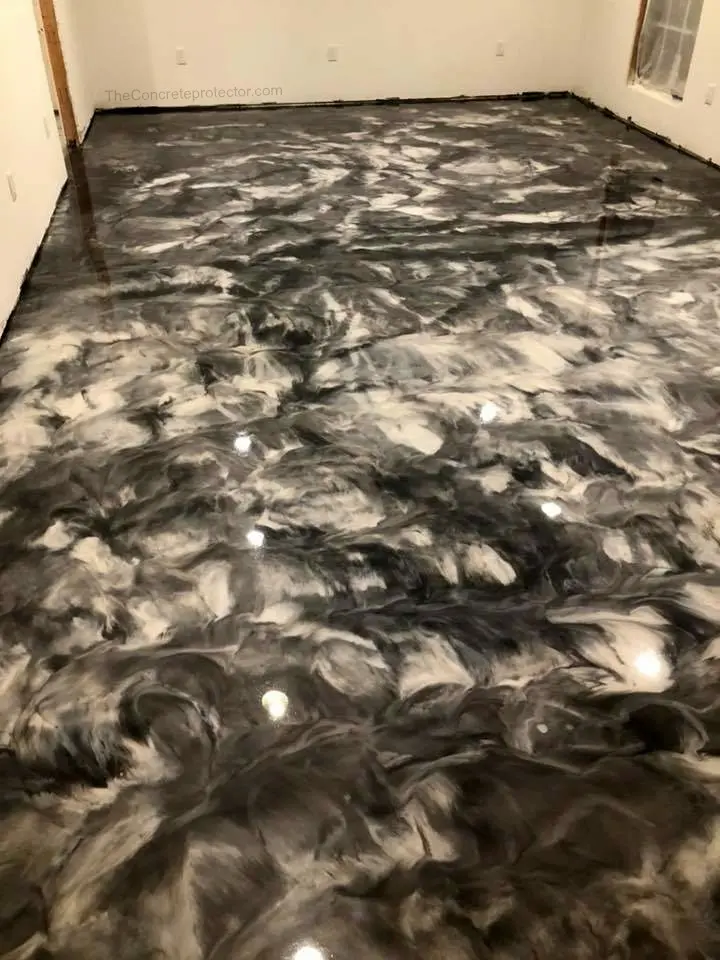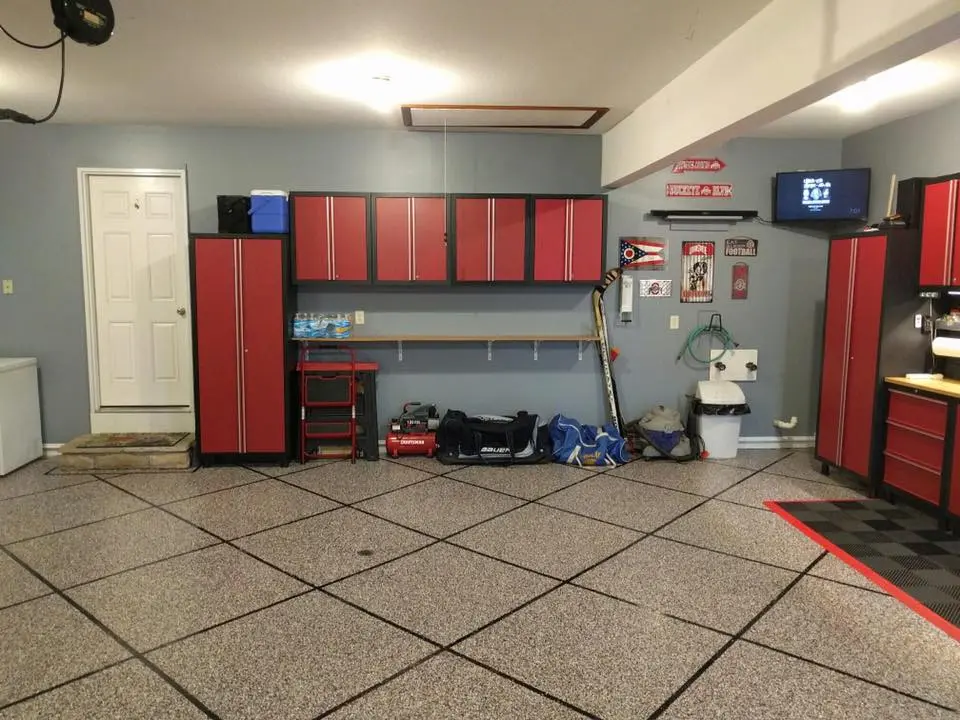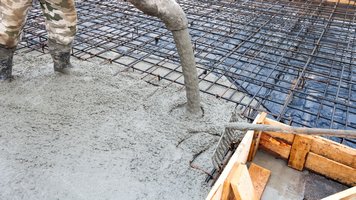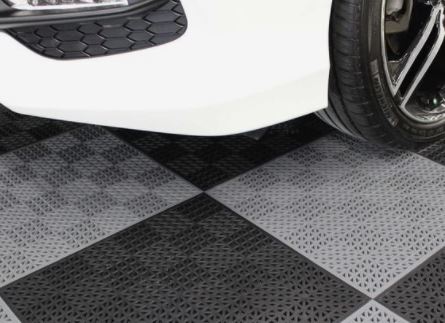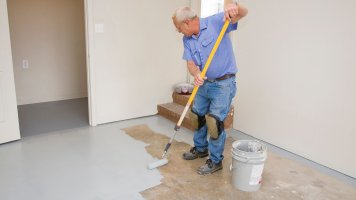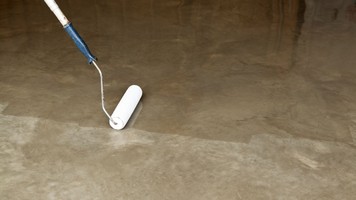What Is Garage Floor Epoxy? (Benefits, Installation & Cost)
This post contains affiliate links.
Suppose you are looking to upgrade your garage floor beyond bare concrete. There are many options you can consider. You can paint it, put a layer of vinyl flooring on it, and more. There are also options, such as rubber flooring.
One popular option is to apply a layer of epoxy. You may even see this being done on not just flooring but also countertops and walls. However, what is garage floor epoxy?
Garage floor epoxy is a polymer-based flooring. It provides tough, durable hardness to the floor. Epoxy flooring is popular for commercial or industrial use. Epoxy flooring is also easier to maintain and clean than other flooring systems.
This article looks at epoxy as an option for your garage flooring needs. We also explore its uses and how you can apply the flooring yourself. Finally, we try to answer some of the most common questions many people may have about epoxy flooring.
What Is Epoxy Flooring?
Epoxy flooring is a popular way to finish the floor surface indoors and outdoors. You can imagine epoxy flooring as a thick, shiny, and strong paint for your floor.
Once applied, it offers a durable and protective surface. It also provides some aesthetic flexibility since epoxy flooring can have many finishes. You can also polish it to create a high-shine finish.
Epoxy is made up of resin and a hardener, which you then combine together just before application. You generally use a squeegee to apply the liquid epoxy on the floor before allowing it some time to dry.
Once dried, the epoxy surface becomes a thick, durable surface on top of your bare floor. The resulting epoxy surface is resistant to stains, chemicals, and impact. It can also handle heavy-duty use, such as high human traffic or vehicles.
Epoxy flooring is popular in garages and basements. Epoxy flooring is also popular in warehouses, shops, and factories. Some people use epoxy flooring in residential spaces.
Is Epoxy Flooring and Epoxy Paint The Same Thing?
Epoxy flooring and paint are not the same thing. Epoxy flooring contains more epoxy and hardening agents. It gives a thicker, more durable floor surface. Epoxy floor paint is primarily floor paint with some epoxy inside. It is not as durable as an epoxy flooring.
Suppose you have been researching epoxy flooring. You may notice that people mention epoxy flooring and epoxy floor paint. Are they the same?
They are not. Epoxy flooring and epoxy floor paint are two different things with minor similarities. They differ in several ways:
Formulation
Epoxy flooring is made of two major ingredients, epoxy, and hardener. Sometimes, people add color dyes or sand may be added to give the final flooring a different finish.
Epoxy floor paint is, however, made primarily of paint. The paint formula may contain some amount of epoxy inside. This helps to create a more durable layer than regular paint.
Application
Epoxy flooring is applied by first mixing the epoxy and hardener together. The mixture is then poured on the flooring and spread around the surface using a squeegee. The surface is then allowed to cure before the other surface is applied.
Epoxy floor paint is more straightforward. You usually only need to shake the paint to ensure it is even before applying it directly to the floor. Instead of a squeegee, you use a roller to apply the paint evenly across your surface.
Durability
Epoxy flooring tends to be much more durable than epoxy floor paint. This is because the epoxy flooring has a thicker surface and more epoxy. This resulted in stronger moisture, impact, and wear resistance.
Epoxy floor paint does not contain a lot of durable materials inside. This means they wear out faster. You may notice the paint wearing off fast under heavy-duty use.
What Are The Benefits Of Having Epoxy For Garage Floors?
Epoxy garage floor provides tough, durable protection for your bare floor. It also allows you to customize the look of your flooring easily. Epoxy flooring is also easy to maintain, unlike wood, tile, or vinyl-based flooring.
Epoxy flooring for your garage actually comes with many upsides. In most cases, they provide you good protection at a good value. Here are some upsides of using epoxy flooring for your garage floor:
Durable Protection For Your Garage Floor
Epoxy flooring is very durable for your garage floor. Once applied, you should be able to expect years, even decades, of protection for your floor. In general, epoxy garage floors offer the following:
Impact resistance: Epoxy floorings are tough and can withstand impacts. These include dropped tools, equipment, or heavy objects. They generally do not crack or chip when impacted, as it has some impact absorption abilities.
Chemical Resistance: Epoxy flooring can also resist chemicals common in garages. These include oils, lubricants, solvents, or cleaning agents. This is because epoxy has a non-porous surface that repels them.
Abrasion Resistance: Epoxy flooring is also capable of handling abrasion well. As a result, they are perfect for floor surfaces with heavy foot and vehicular traffic. It should also hold itself well against scraping.
Solid epoxy flooring can last 5 to 15 years in a residential garage if applied well.
Epoxy Flooring Offers Lots Of Colors and Patterns
One excellent strength of epoxy flooring is that it allows customization. You can have the flooring in any color you want. You can also add chips of silica sand to bring in some glitter to the flooring.
In fact, some actually use the customization ability in very creative ways. They create epoxy mixtures of different colors. Then apply lines to create a surface that looks like natural marble. Some also polish the surface to create a luxurious, glossy surface.
Easy Maintenance
Epoxy flooring is also easy to maintain. You do not need to frequently protect it, such as wood flooring. You also do not have issues such as replacing cracked or discolored tiles.
Epoxy flooring can be maintained by vacuuming and mopping to clean it. You can also apply top coating every 5 to 7 years to maintain its natural finish. The top coating should also retain the flooring’s resistance and durability.
What Are The Disadvantages Of An Epoxy Garage Floor?
Some disadvantages of epoxy flooring include higher costs. At times, epoxy flooring can be tedious to apply. Epoxy garage flooring can also be slippery. Prolonged exposure to heat or sunlight can also wear off the surface’s finishing.
Despite all the upsides of epoxy garage flooring, it also has some issues. Some of these downsides of epoxy flooring may be something you cannot accept.
This means you want to understand its weakness first before you make your decision.
Initial Cost
Epoxy flooring is not the most expensive option to protect your garage floor. You can put more premium finishing for your garage floor, such as wood or tiles.
However, other options are much cheaper than epoxy flooring. You can use epoxy floor paint or stick-on vinyl tiles too. You can also just polish up the concrete floor and leave it as it is.
It generally costs around $250 for a 100% epoxy kit. This kit should be enough to epoxy about 250 square feet of garage flooring. That should be enough for a one-car garage.
If you are looking to hire out the work, your costs may increase, too, as applying epoxy flooring can take a lot of time. It is rather tedious work, requiring repeated work or applying, drying, and polishing.
Tedious Application Work
Another issue with epoxy flooring for your garage is the tedious application work. With tiles or wood flooring, you often require less time. You also do not need to perform a lot of surface preparation work.
With epoxy flooring, you need to spend a lot of time cleaning. You also need to etch the bare floor before you apply epoxy flooring. You also need to mix and apply the epoxy on the floor using a squeegee.
Once applied, you need to wait for the layers to dry up before applying another. In some cases, you may also want to sand down the dried epoxy flooring first. These make epoxy flooring a rather tedious process.
Can Be Slippery
Epoxy flooring can be slippery, particularly if polished to a high shine. This is because the surface itself is non-porous, meaning it rejects all liquids.
This means if you spill any water, oil, or lubricant, these liquids will stay on the flooring surface. They then become fall hazard. If you spill these liquids, you must wipe them away using cloth or paper towels.
As a result, some people actually apply textured or non-slip coatings on top of the epoxy flooring. These layers help to reduce the danger.
Vulnerability To Some Types Of Damages
Epoxy can be very durable, but it does not mean it is invulnerable. Some situations can cause epoxy flooring to deteriorate.
One such way is the hot tire pickup. This situation is where a hot tire comes into contact with an epoxy surface for a long time. When this happens, the epoxy surface can sometimes peel off. Prolonged exposure to the sun can also discolor the epoxy flooring and dull its finish.
Is Epoxy Flooring Permanent?
Once applied, epoxy flooring is permanent. However, you can still remove epoxy flooring, although you must use an epoxy stripper. You then scrape the epoxy surface away, which can be tedious, tiring work.
Generally, once you have applied the epoxy flooring, it is a permanent finish. You may not be able to remove it as easily as stick-on vinyl flooring. It is definitely easier to remove tiles than floor epoxy.
However, this does not mean you cannot remove epoxy flooring forever. It is still doable, although you may need to spend time doing some tedious, hard work.
Start by applying a generous amount of epoxy stripper (paid link) on the epoxy flooring. Allow it some time to interact before scraping the surface away. The scrapping work will take a long time and can be tedious.
Can You Apply Garage Floor Epoxy Yourself?
Suppose you are a die-hard DIY person and want to do everything yourself. If you are looking at applying garage floor epoxy yourself, the good news is you can.
This is because applying epoxy does not need expensive or specialized equipment. You can buy all the tools and equipment you need for the job without blowing your budget.
You also stand to save a lot on labor fees since applying epoxy flooring can take a long time. This means if you hire out the job, it will cost a lot.
In most cases, expect to shell up $600 to purchase epoxy flooring kits. Within this budget, you should be able to cover around 500 square feet of garage floor. That’s about the size of a 2-door garage.
How Much Is a Gallon of Epoxy?
| Type | Price Per Gallon | Pro & Cons |
|---|---|---|
| Water-Based | $30-$50 | Least expensive. Weakest. Sustains only minor scratches, Reapply every 1-3 years. |
| Solvent-Based | About $45 | Slightly stronger than water-based. Apply in lower temperatures. |
| 100% Pure Solid | $45-$150 | Strongest & Most durable. Resist heat, scratches & Chemical spills. |
How Much Does It Cost to Epoxy the Garage Floor?
If you want the job done by professionals or DIY, Here is up-to-date info at Homeadvisor.com and Homeguide.com
https://homeguide.com/costs/epoxy-flooring-cost
https://www.homeadvisor.com/cost/outdoor-living/install-concrete-coating/
Rust-Oleum Offers Quality DIY Epoxy Coating Kits for Garage Floors. Check the prices out at Amazon.
How To Apply Garage Floor Epoxy?
To apply epoxy flooring on your garage floor:
- Prepare the surface, such as cleaning, patching cracks, and etching.
- Apply a layer of primer.
- Mix and apply a layer of epoxy.
- Cure and finish the epoxy layer.
It is doable if you intend to apply epoxy flooring yourself on your garage floor. The key is to use the right tools and have the right amount of material in hand to ensure you can get the job done well.
You should also wear safety equipment, such as breathing masks, as epoxy can smell strongly. Inhaling the smell for a prolonged period can cause health issues.
This guide is prepared assuming your garage floor is a bare concrete floor. Suppose your garage has a different flooring. In this case, check with your epoxy brand to see if there are any specific instructions.
Clean The Concrete Floor
You need to start by cleaning the concrete floor. Floor the steps below for a good, satisfactory clean:
- Start by removing all furniture and items on top of the floor surface you intend to apply epoxy.
- Sweep the floor, ensuring you have removed the larger debris and dust.
- Vacuum the floor, focusing on the cracks and fine lines on the floor to remove finer debris and particles.
- You may need to fill in the cracks and holes. Use a concrete filler (paid link) to do the job.
- Use a degreaser or concrete cleaner to remove oil, stains, or grease.
- Now use a wet mop, and wipe down the floor well. This ensures all debris and cleaners are removed as much as possible.
Read More: How to Clean the Garage
Etch The Concrete Floor
Now that the concrete floor is clean, you can start etching the floor. Etching basically roughens the floor surface. This helps the primer and epoxy to adhere to the surface better.
To etch your concrete floor:
- Prepare your etching solution. You usually mix them with some muriatic acid and water.
- When mixing, follow the instructions from the maker of the etching solution.
- Apply the etching solution. A brush is common, although some may use a sprayer. Then scrub up the surface using a brush.
- Now rinse the solution away with water. Allow the bare floor to dry up completely before proceeding to the next step.
Apply Primer Coating
The next step would be to apply a layer of primer. The primer helps the epoxy to adhere and bond better to your floor.
- Start by mixing and shaking up your primer. This is because most primers may have sat on shelves for a long time. This means the ingredients inside may have separated.
- Use a brush or a roller with a long stick to apply the primer coating on your floor. You usually work on smaller sections to ensure even layers have been applied. Then you continue until all areas are covered.
- Allow the primer coating to dry. In most cases, drying should take several hours to overnight.
Mix and Apply Epoxy Layer
Now that the floor is completely ready, it is not time to lay in the epoxy. The process of laying in epoxy can be a bit tedious, but follow the steps well, and you should get a beautiful result:
- Start by mixing your epoxy resin and hardener. Check with the manufacturer of your epoxy resin, and ensure you are mixing at the right ratio. Too much hardener means the epoxy cures too fast. Too little may mean a much longer waiting time.
- If you plan to have coloring on your floor, add color dyes. You can also add finishings such as glittering sands during this stage.
- Once mixed, start applying the epoxy resin. In many cases, you pour an amount of resin on the floor and then use something to spread the resin out.
- Common tools include a squeegee, roller, or brush. Try to use tools with a long handle, so you can work standing.
- Work in small sections, starting from the farthest corner and moving towards the exit.
Curing and Finishing
- As the epoxy dries, consider returning to check for air bubbles on the surface. If you see any, blow the bubbles away using a blow torch. Just quickly run the fire over the surface.
- When inspecting your epoxy flooring, wear shoes with spiked bottoms. Your epoxy flooring application kit should have this.
- The drying process may take between several hours to 3 days. Actual drying depends on the weather, types of resin used, and other reasons.
- When curing, keep the area well-ventilated to avoid fumes from building up to toxic levels.
- Once the epoxy layer has dried, inspect for any imperfections. In most cases, you can remove these imperfections using sandpaper.
- Give the new epoxy surface a wipe-down, and allow it to dry.
- If you have a topcoat or sealer, this is the time you can apply them. You usually use a roller brush and roll them over the floor.
- Similar to applying primer, work in small sections. Start from the farthest corner, and work towards the exit.
- Use the new epoxy flooring lightly for the first 1-2 weeks. Once fully cured, you can subject it to heavy items and heavy-duty wear.
Tips When Applying Garage Floor Epoxy
Tips when applying garage floor epoxy include:
- Check for moisture
- Ensure the surface is ready.
- Prepare the epoxy mixture accordingly.
- Allow sufficient curing time.
When applying garage floor epoxy yourself, sometimes you may make rookie mistakes. If that happens, you may either get unsatisfactory results. Worse still, the results can be so bad it’s a complete waste of your time.
Here are some tips to ensure you get the best results when laying epoxy flooring for your garage:
Check For Moisture
One of the biggest enemies of epoxy flooring is moisture. This means you want to check your floor for moisture before applying any epoxy layer on it.
To check for moisture on your garage floor, follow the steps below:
- Tape a plastic bag to your garage floor, and leave it for 24 hours.
- Come back and lift the corner of the plastic bag. If it is bone dry, you can lay it in epoxy. If you detect moisture, the flooring needs some work first.
- In most cases, you need to lay in a waterproof layer and then relay a new layer of concrete on top.
Ensure the Surface Is Really Ready Before Applying
Epoxy does not just randomly adhere to anything. You need to ensure your garage floor is ready before applying any epoxy layers.
In many cases, you will need to remove any treatments applied on your flooring before, such as:
Concrete Sealers: Concrete sealers seal and protect the bare concrete surface. It also fills in any cracks and holes on the floor surface. You cannot apply epoxy on top of concrete sealers, as it will not adhere.
You will need to remove the concrete sealers first. Apply some concrete sealant remover on the surface, then allow the solution some time to work. Then, scrape or scrub away the sealant, revealing bare concrete below.
Floor Paint: It can also be common to see floor paint on many surfaces. This is because finishing and protecting bare concrete floors is a cheap option. Similar to sealers, epoxy will not adhere to it well.
You will need to remove the floor paint before applying epoxy. The paint remover should work here. Apply the solution, then scrape the floor paint off using a scraper or a brush.
Prepare Epoxy Accordingly
Your epoxy flooring kit should often come with two different solutions. You should see a bottle of epoxy resin and a smaller bottle of hardener. The hardener helps the epoxy to cure. Without it, the epoxy remains in liquid form.
Before applying them on the surface, you must mix them in the right ratio. Consult the user guide for the proper ratio. If there is none, confirm the right mixing ratio with the manufacturer first.
Also, ensure the mixture is mixed up evenly before you apply them. Consider mounting a stirrer to your hand drill (paid link), and use the drill to help you mix the epoxy solution evenly.
Allow Sufficient Curing Time
Much like asphalt, epoxy flooring hardens over time. The epoxy may take several hours to 3 days to harden up. But epoxy only reaches its hardest potential after it has fully cured. This takes about 1 – 2 weeks.
This means you want to allow the epoxy flooring some time during the curing process. Do not immediately subject it to hard use, such as placing heavy objects on it. You also want to limit the number of people walking on the surface.
Once it has fully cured, then go ahead and subject it to heavy-duty use. This is because the flooring is now at its hardest, which means it should take this abuse with a smile.
FAQ About Garage Floor Epoxy
Can I Epoxy My Garage Floor During The Winter?
Avoid epoxy on your garage floor when the temperature is low. In fact, it is advisable to only apply epoxy when the surface temperature is a minimum of 55 °F (about 13 °C)
This is because cold temperatures can affect the epoxy mixing process. It can also affect the epoxy’s chemical reactions during and hardening process.
The drying process that epoxy goes through is exothermic, meaning it releases heat. The exothermic reaction may not happen well if the surrounding temperature is low.
Your epoxy may not cure and harden well. As a result, your flooring may not have the maximum durability and performance.
If you plan to apply epoxy on your garage floor, do it during warmer days. If you still must epoxy your garage floor on cold days, consider turning on garage heaters. This should warm up the floor’s temperature, helping the curing process.
Can You Pour New Epoxy Flooring Over the Old Flooring?
If there has been heavy traffic and garage use, the clear topcoat of an epoxy floor can start to show its age. With the proper floor preparation, you can add another coat and make the floor look brand new.
Suppose the flooring now has epoxy, polyurea, polyaspartic, or polyurethane. In this case, you should be able to apply an additional coat of epoxy flooring on top without issue.
But, to be safe, you should always consult with the epoxy flooring manufacturer first. They may be able to give you better instructions.
Suppose the coating is moderately worn with more concrete showing through than epoxy. In this case, start fresh by grinding the floor down first. Prep the floor the same as applying epoxy the first time over concrete.
Suppose the floor is not experiencing any delamination issues. In this case, you can often recoat over a worn epoxy floor to create a brand-new-looking finish.
However, roughing up the old flooring may be better before applying a new epoxy flooring layer. This helps the new layer adhere better. Use 80-120 grit sandpaper on the old surface before applying a fresh coat.
This process also helps to remove any scratches or embedded dirt that has marred the finish. Orbital or pole sander works great.
What Are The Other Alternatives To Epoxy Flooring?
If you prefer liquid-based flooring for your garage, epoxy is but one of the options. You can consider other options, depending on your budget and preferences.
Acrylic & Polyacrylic: These sealers cost $0.15 to $0.25 per square foot for materials. If you add in the tools, it should cost $0.70 to $0.90 per square foot to install. This should bring a total price of $0.85 to $1.15 per square foot.
Acrylic sealers are easy to spray on without bubbles or roller marks. You can also purchase them in a matte or gloss finish.
Polymer or Polyurethane: These sealers range from $0.20 to $0.25 per square foot, not including labor. Including installation, expect to pay $0.95 to $1.10 per square foot.
Poly coatings typically set more quickly than other sealers. They can also withstand a broader range of temperatures. It is also popular as a top coat on top of epoxy flooring for better protection.
How Do You Maintain an Epoxy Floor?
One good thing about epoxy flooring is how easy they are to maintain. You generally do not need to do too much to keep them in good shape:
Wipe Stains: Epoxy flooring is non-porous and does not absorb fluid. However, the liquid will pool on the surface, making the floor slippery. Consider wiping stains away with a paper towel when you can.
No Strong Cleaners: Epoxy flooring generally does not absorb liquid. This means it does not pick up stains. As a result, you do not need to use harsh cleaning agents to clean the surface. Water and household floor cleaners are all you need. Avoid using any acid, citrus, or abrasive cleaners.
Avoid Prolonged Sun Exposure: One of the fastest ways to break down your epoxy flooring is to expose it to sunlight long-term. The UV rays can break down epoxy, causing it to delaminate or become dull. When possible, close your garage door to prevent exposing your epoxy flooring to the sun.
Avoid Direct Contact With Heat: Avoid exposing your epoxy flooring to direct heat sources, such as a hot tire or iron. The heat may degrade the epoxy flooring, causing it to delaminate.
Can You Pressure Wash the Epoxy Floor?
You can pressure wash epoxy flooring. This is because epoxy flooring has a durable, tough, and strong surface. They can easily withstand high-pressure water jets.
However, in most cases, you do not have to. This is because epoxy flooring is non-porous. It repels instead of absorbing stains. As a result, stains stay on the surface, making removal easy.
A casual mop down is usually all you need to clean your epoxy floor. Pressure washing may be a little too much, akin to slaughtering a chicken with a chainsaw.
How Long Does Epoxy Floor Smell Last?
The smell is one of the first things you may observe as you open your epoxy bottles. Some described the smell as vinegar or nail polish. Some also say it has a fragrant, sweet scent, similar to gasoline.
However, these are powerful smells. You do not want to breathe on them for too long or risk some health issues. The epoxy may continue emitting the smell for the next three to three days as it cures up.
The smell may gradually die down after several days. The epoxy should be fully cured after about 1-2 weeks, meaning no more smell in your garage.
Does Epoxy Garage Floor Increase Home Value?
In general, a garage with epoxy flooring should fetch a higher price. This is because epoxy flooring is a better finish than bare concrete floors.
A good home buyer should also recognize that you have invested money to lay the epoxy flooring. This means that should be reflected in the house prices too.
However, do not expect too much, as the rise in home prices may not be as noticeable. Epoxy flooring is not a major investment in homes. Things such as insulation or a larger garage may increase the home value more.
READ MORE: What Are Your Different Options for Garage Flooring?
